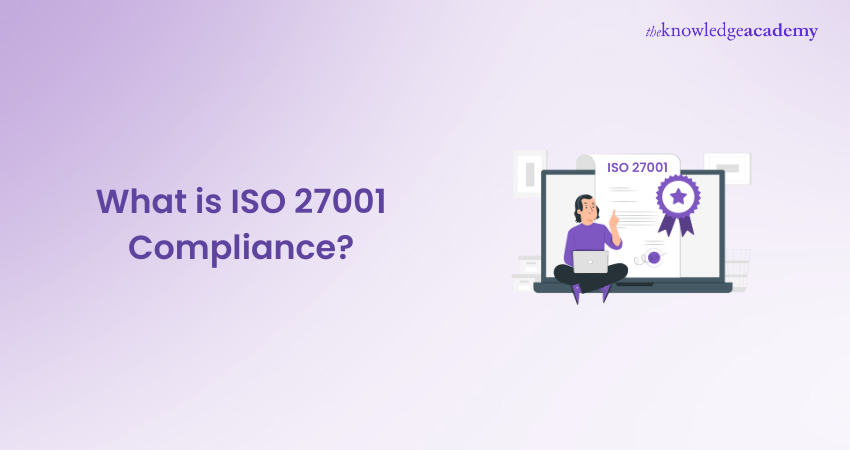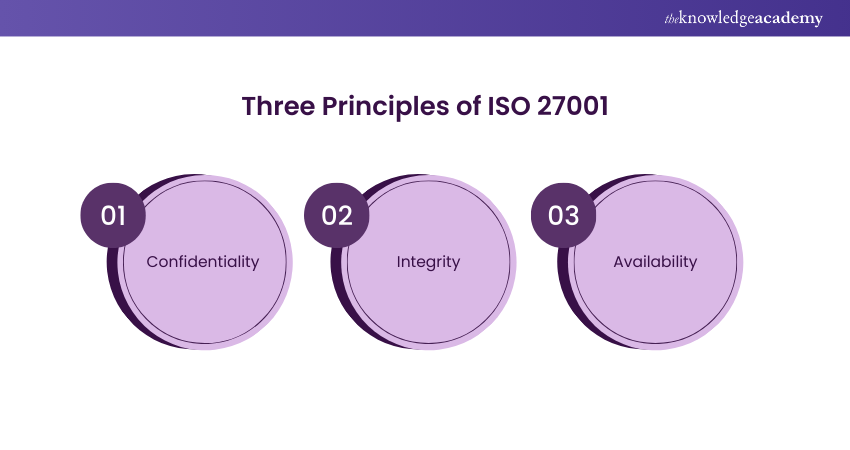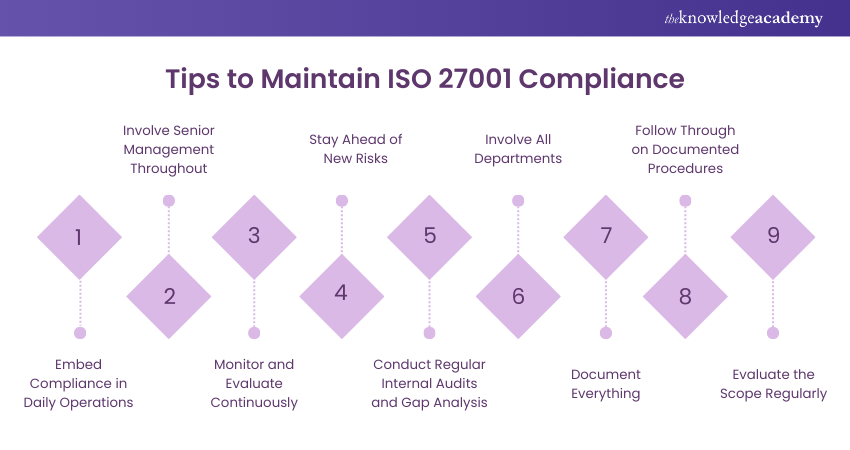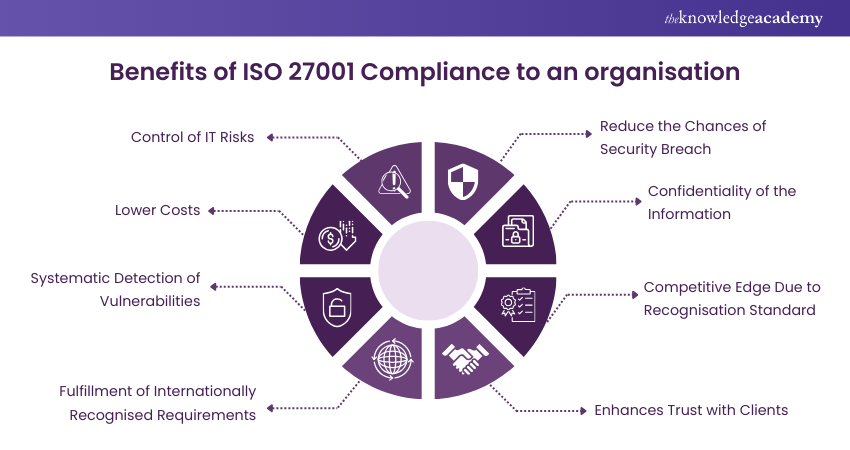We may not have the course you’re looking for. If you enquire or give us a call on +60 1800812339 and speak to our training experts, we may still be able to help with your training requirements.
We ensure quality, budget-alignment, and timely delivery by our expert instructors.

Enter ISO 27001 Compliance – a globally recognised standard for information security management that not only helps protect your organisation's data but also instils trust among your clients and stakeholders. In this blog post, we'll delve into the essentials of ISO 27001 Compliance, exploring what it is and why it matters in the ever-evolving landscape of cybersecurity. We'll provide practical tips for achieving compliance, highlight the numerous benefits it offers to your organisation, and share insights into the implementation process.
Whether you're a business owner, IT manager, or simply someone interested in understanding how to better safeguard information, this comprehensive blog will equip you with the knowledge you need to navigate the complexities of ISO 27001 Compliance. Join us as we uncover the important components of this standard and help you take the first steps towards a more secure future.
Table of Contents
1) Understanding ISO 27001 Compliance
2) What are the Principles of ISO 27001?
3) ISO and the Objective of the ISO 27001 Framework
4) What are the ISO 27000 Standards?
5) ISO 27001 Supporting Standards
6) Tips to Maintain ISO 27001 Compliance
7) Is Certification or Compliance with ISO 27001 Essential?
8) Requirements for ISO 27001 Compliance
9) Things to Know About ISO 27001 Compliance
10) Things to Know About Achieving and Maintaining Compliance
11) Conclusion
Understanding ISO 27001 Compliance?
The ISO 27001 is an international standard which provides a framework for establishing, implementing, managing, and updating an Information Security Management System or (ISMS), enabling organisations to manage risks related to their data security according to international standards.
ISO 27001 Certification serves as a benchmark for organizations to ensure the confidentiality, integrity, and availability of sensitive information, as outlined in the ISO 27001 Standard PDF. The compliance helps identify potential security risks, implement appropriate controls, and regularly review and update security measures to adapt to evolving threats.
What are the Three Principles of ISO 27001?

ISO 27001 defines an Information Security Management System (ISMS) as a systematic approach to managing sensitive company information so that it remains secure.
1) Confidentiality: Information which may be accessed only by authorised personnel.
2) Integrity: Information must be able to change only by authorised persons.
3) Availability: The data must be available to the authorised person every time it requires.
ISO and the Purpose of the ISO 27001 Framework
ISO is an independent, non-governmental international organisation that creates standards by consensus from national standards organisations in countries all over the world.
The ISO 27001 framework is a set of criteria for creating, developing, operating, and supporting an Information Security Management System (ISMS). It stands alone as the international benchmark that holders affirm when security management needs to be more controlled.
The primary role of this ISO security framework is to manage information in a systematic and effective way, irrespective of the size or industry.
Learn everything you need to know about ISO 27001 by signing up for our ISO 27001 Certification Today!
What are the ISO 27000 Standards?
A set of standards supporting the implementation and management of information security is called ISO 27000 series. Each standard in this family covers different aspects of information security management. A few of the most important standards in ISO 27000 series are:
1) ISO 27000: This standard provides an overview about what it is ISMS, outlining its basic concepts and terminology.
2) ISO 27001: It provides the requirements for establishing, implementing, maintaining and continually improving an ISMS. This international security standard meets the basic requirements of
3) ISO 27002: It is intended to be used within an organisation together with other standards such as ISO/IEC 17799.
4) ISO 27005: ISO 27005 Provides directions for companies looking to assess and manage risk associated with information security.
5) ISO 27017: ISO guidelines on the service info security; “brother” to standard #9, outlines a bare minimum of well-tried protection measures placed in annexes concerning triple divisions of information security controls.
6) ISO 27018: Provides frameworks for maintaining superior framework of protection across public cloud services whilst adhering to European rules on data processing.
All of them contribute to the general aim at enhancing information security, as defined in that they are offering concrete tips and best practices on how-to implement certain aspects of security management.
ISO 27001 Supporting Standards
ISO 27001 Supporting standards ISO/IEC 27001 is the central part in a family of Information Security Management Systems (ISMS). The additional recommendations and best practices of these supporting standards help organisations to properly implement and maintain a strong ISMS. Its major supporting standards are.:
1) The ISO/IEC 27000 series of standards contains terminology and definitions used in the standard.
2) According to above statement, guidelines for implementing controls listed in Annex A of ISO 27001 are provided by ISO/IEC 27002.
3) Measurement of information security is elaborated by ISO/IEC 27004 which is compatible with ISO 27001 because it shows how to find out if ISMS has met its goals.
4) ISO/IEC 27005 offers guidelines for information security risk management. Its detailed information about performing risk assessment may probably be considered as point of greatest complexity in its implementation, and it makes a great addition to ISO 27001.
5) ISO/IEC 27017 gives guidelines on cloud computing information security; it is based on IS0/IEC 27002 code of practice designed for cloud services.
6) ISO/IEC 27018 contains recommendations for privacy protection within the Cloud Environment; it is based on the code of practice found in ISO/IEC 27002 concerning PII processors hosted on public clouds acting as such.
7 ISO 27031: It is focused on business continuity management, so it defines the guidelines to make sure you have good enough ICT readiness for business continuity.
These are seminal standards that give guidelines on building an ISMS around certain needs of the organisation and their industry, to strengthen information security management.
Tips to Maintain ISO 27001 Compliance
The ISO 27001 certification is valid for just three years, and annual surveillance audits must be conducted during this period. This indicates that the framework is a continuous endeavor that needs consistent care, not just a one-time project.
As the business evolves, the ISMS (Information Security Management System) will need to adapt. For example, a company that moved from on-premises to cloud applications over the past decade will have a very different approach to information security today.
Keeping ISO 27001 Compliance Secure Your Organisation Today Maintaining adherence to the top security standards such as these is part of an ongoing process that will add value if taken seriously. To help your organisation to be compliant, here are some tips:

Key Points to Keep in Mind:
1) Embed Compliance in Daily Operations: Don’t treat the framework as a separate task. Integrate it into everyday business operations for better value and consistency.
2) Involve Senior Management Throughout: Commitment from top-level stakeholders should continue beyond initial certification. Their support is crucial for long-term success.
3) Monitor and Evaluate Continuously: Regularly assess the framework and ISMS as part of your overall security strategy. If there’s a security incident, review how the ISMS affected the outcome and document corrective actions.
4) Stay Ahead of New Risks: ISO 27001 focuses on risk management. Since risks evolve with new cyber threats and business growth, regularly assess and address emerging risks.
5) Conduct Regular Internal Audits and Gap Analysis: Don’t wait for recertification to discover critical control lapses. Regular audits help maintain compliance.
6) Involve All Departments: ISO 27001 isn’t just for IT. It covers people controls too, meaning HR and other departments must also be involved in ongoing maintenance.
7) Document Everything: Proper documentation is essential for future audits. Actions taken by your organisation that align with the ISMS must be recorded.
8) Follow Through on Documented Procedures: During audits, auditors will check if the documented policies, like annual security awareness training for employees, are being implemented.
9) Evaluate the Scope Regularly: If your company expands into new business units or regions, reassess whether ISO 27001 Compliance needs to extend to these new areas.
10) Don’t Overlook the Supply Chain: If your business relies on cloud or SaaS services, ensure these are also covered in your ISMS.
Is Certification or Compliance with ISO 27001 Essential?
The direct answer to this is no. It is not mandatory to get certified with ISO 27001. However, it can be required for certain situations based on the industry and nature of work. For example, while conducting business with third-party clients, they might insist that you have ISO 27001 Compliance due to data security concerns
So, while this certification is not necessary, it can be crucial in some instances to ensure that your organisation takes data security seriously. It can also help organisations attract more potential clients and expand their businesses in domains like Information Security
Requirements for ISO 27001 Compliance
To comply with the ISO 27001 Latest Version, an organisation needs to meet several core requirements. These requirements are listed as follows:
1) The organisation needs to demonstrate an understanding of issues that may impact the ISMS: An organisation needs to show that it has a clear understanding of the issues that might affect the ISMS, both internally and externally.
2) The organisation should know needs to know the needs and expectations of stakeholders: An organisation needs to be familiar with the needs and expectations of the stakeholders who may be impacted by the ISMS. The organisation must also identify the group of stakeholders who may be affected and map their requirements, particularly regarding compliance.
3) The organisation needs to determine the scope of the ISMS: An organisation needs to follow a well-defined scope determination process. The organisation should identify which systems will potentially be impacted by the ISMS from a compliance perspective. To do this, the organisation should document all the information management systems deployed.
4) The organisation needs to define an ISMS: An organisation must establish a working definition of an ISM, so that ISO 27001 Compliance professionals understand the purpose of passing the checklist.
5) Needs to have leadership and commitment: The organisation must provide evidence that the leadership is aware of the initiative and has made efforts to comply with the standardised set of processes.
6) The organisation needs to have well-defined policies and objectives: The roles of employees in different departments of the organisation need to be clearly defined. A standard process also needs to be established to ensure that the targets are met towards passing the ISO 27001 Audit. Policies and objectives must be established as a prerequisite.
7) The organisation needs to have a well-defined support process: A well-defined support process must also be established to gain ISO 27001 Compliance.
8) The organisation needs to have a well-defined operation process: To achieve ISO 27001 Compliance, the process of how operations work in the organisation should be established as well.
9) The organisation needs to perform iterative performance evaluation: Performance evaluation is one of the most important prerequisites for ISO 27001 Compliance. A repetitive process of evaluation to check whether the organisation is meeting its targets must be put in place. This iterative evaluation improves efficiency of the organisation and ensures that the objectives are met.
10) The organisation needs to have well-defined improvement objectives: To comply with the ISO 27001 standard, an organisation also needs to define its improvement objectives. Establishing a set of improvement objectives helps ensure preparation for the audit and passing it.
Signup for our course on ISO 27001 Internal Auditor and learn how to perform Internal Audits and secure ISMS
Things to Know About ISO 27001 Compliance
This section of the blog will elaborate further on everything you need to know about the ISO 27001 Compliance.
What are the Benefits?

Compliance with ISO 27001 guarantees many benefits for an organisation. There are several advantages that compliance with ISO 27001 Checklist provides, some of them have been which are listed as follows:
1) Ensuring information security risk mitigation: The most significant benefit that ISO 27001 provides an organisation is that it proactively ensures Information Security risk mitigation. ISO 27001 Compliance also improves an organisation’s ability to comply with the updated data protection standards.
2) Sharpening an organisation’s competitive edge amongst competitors: ISO 27001 Compliance helps an organisation demonstrate security practices updated to the current global standard. This can help an organisation improve its relationship with clients and ensure a competitive advantage over its industry counterparts.
3) Helping an organisation avoid financial losses associated with security breaches: Due to ISO 27001 being the current global standard for effective Information Security, it helps an organisation avoid expensive security breaches. By complying with ISO 27001, an organisation can help mitigate the risk of data breaches that are potentially very expensive to fix. ISO 27001-certified organisations assure clients, partners, and stakeholders that they have taken the right measures to protect data in case a breach occurs. This helps an organisation minimise the financial and reputational damage that a data breach usually causes.
4) Protecting and enhancing an organisation’s reputation: As cyberattacks increase in number by the day, organisations are now more exposed to financial and reputational damage than ever before. This makes an ISO 27001-certified ISMS so important for modern-day organisations as they try and fight against such threats. It also assures clients and stakeholders that an organisation has taken the necessary steps to protect its valuable data.
5) Helping an organisation comply with regulatory requirements: Compliance with ISO 27001 helps an organisation select the adequate security control to protect its information in line with regulatory requirements. ISO 27001 Requirements helps an organisation comply with rigid regulatory such as the GDPR (General Data Protection Regulation) and Network and Information Systems (NIS) Regulations.
6) Helping an organisation improve its structure and focus: Compliance with the ISO 27001 standard helps boost an organisation’s productivity by clearly defining its information risk responsibilities. Having a well-defined structure for managing information risks has several benefits of ISO 27001, such as increased productivity, improved decision-making, and reduced effort and costs.
7) Helping an organisation reduce the need for frequent audits: An ISO 27001 certification mandates regular reviews and internal audits of the ISMS. Professionals who have successfully implemented and maintained ISO 27001 systems often pursue careers as ISO 27001 Lead Auditors, leveraging their expertise to guide other organisations on their journey to achieving and maintaining information security compliance. ISO 27001 Interview Questions can help professionals prepare for roles that involve audits and compliance. This element of frequent reviews ensures continual improvement in an organisation, and helps it improve its efficiency. Additionally, the ISMS will be subjected to external audits at specific intervals to ensure that the ISO 27001 Physical Security controls are working. This assessment provides a clear picture of whether the ISMS is functioning as intended and provides the security needed to protect organisational data.
Signup for our ISO 27001 Lead Implement Training courses and learn everything about the global standard for information security management systems
What are the Necessary Documents?
There are several necessary documents required to ensure that an organisation can comply with the ISO 27001 standards, they've been listed below:
1) ISMS Scope
2) Information Security Policy
3) Information Security objectives
4) Evidence of competence of people working in Information Security
5) Results of the Information Risk Assessment
6) ISMS Internal Audit Program and results of audits Conducted
7) Evidence of leadership reviews of the ISMS
8) Evidence of non-conformities identified and corrective actions arising
Get the ISO/IEC 27002 PDF now and start implementing best practices to safeguard your organization’s sensitive information.
How to Define the ISMS Scope?
One of the primary requirements for the implementation of ISO 27001 in an ISMS is to define the scope of the ISMS. In order to achieve this, one needs to take the following steps:
1) Inventory information: The organisation must document all information stored in any form, whether physical or digital, locally or in the cloud.
2) Identify ways of accessing information: The organisation should identify the various ways in which information can be accessed.
3) Determine the scope of data in the ISMS: An organisation must define which data is in scope for its ISMS and which is out of scope.
What is the Certification Process?
The Certification Process involves several steps, which we will explore as follows:
1) Firstly, the organisation should develop an ISMS that includes policies and procedures.
2) Next, the organisation should perform an internal audit to identify areas for improvement.
3) After that, the organisation should invite external auditors to conduct a basic review of the ISMS.
4) The ISMS review should be followed by correcting the issues found.
5) Finally, the organisation should have an accredited certification body perform a detailed audit of the ISO 27001 components to verify compliance with policies and procedures.
The ISO certification process can be lengthy and completed over the course of three to twelve months. It should be noted that ISO does not issue ISO certifications. Instead, third-party auditors verify that an organisation has implemented relevant practices in compliance with the ISO standard. Many organizations perform a preliminary gap analysis against the standard to identify areas for improvement and to enhance the cost-effectiveness of the certification process.
What is the Cost of Certification?
The cost of certification varies, and hence every organisation will have a different budget. The main costs during the process include training, external assistance, technology implementation, employee time and effort, and the audit itself.
What is the Duration of Certification?
The certification body performs external audits at least once a year and checks several aspects of the ISMS. The annual audit checks the closure of issues from the last audit, the operation and performance of the ISMS, documentation updates, and reviews of risk management.
Take the first step towards securing your organisation's information with our comprehensive ISO 27001 Foundation course – register now!
Things to Know About Achieving and Maintaining Compliance
Once an organisation achieves ISO 27001 certification, the next step is to maintain compliance. There are a few things that every organisation needs to know about achieving and maintaining compliance, some of them can be listed as follows:
1) For successful certification, stakeholder support is crucial. Commitment from all stakeholders is required to identify areas of improvement, prioritise and implement changes, and ensure regular reviews.
2) An organisation needs to define the impact of ISO 27001 Framework on itself. The organisation needs to consider the needs and requirements of all parties, including stakeholders and employees, and internal and external factors that could potentially impact information security.
3) An organisation needs to write a statement of applicability to maintain ISO 27001 Compliance. The statement should consist of the specific ISO 27001 controls that apply to the organisation.
4) Risk assessment should regularly be done by the organisation. For every assessment or review made, a risk treatment plan should be created that details how the risk will be addressed.
5) The ISMS performance should be assessed. To maintain compliance with ISO 27001, an organisation needs to monitor and measure its controls on a regular basis.
6) The organisation should implement training and awareness programs to maintain ISO 27001 Compliance. Providing employees and contractors with training in security procedures and raising data security awareness can help maintain compliance.
7) Lastly, an organisation should perform regular, frequent internal audits to ensure that the controls are working as intended. The purpose of internal audits is to detect and address issues before an external audit does.
Ready to ace your ISO 27001 interview? Browse our detailed ISO 27001 Interview Questions & Answers and get prepared today!
Conclusion
It is more than just ticking a box with ISO 27001 Compliance; it establishes trust, safeguards against risk and changing threats by securing the information assets from which an organisation derives its business values. Adoption of the ISO 27001 framework means you are leveraging excellence and security in the modern digital era. This is the ethos of ISO 27001; secure today, resilient tomorrow.
Advance your career with our ISO 27001 Lead Auditor course. Gain expertise in auditing and ensure top-notch data security. Join today!
Frequently Asked Questions
Where is ISO 27001 Mandatory?

ISO 27001 isn’t mandatory by law in most places but may be required by some industries, contracts, or regulatory environments that handle sensitive data, such as finance or healthcare.
What are the Pros and Cons of ISO 27001?

Pros: Enhances data security, builds customer trust, improves compliance.
Cons: Can be costly, time-consuming, and requires ongoing effort to maintain compliance.
What are the Other Resources and Offers Provided by The Knowledge Academy?

The Knowledge Academy takes global learning to new heights, offering over 3,000 online courses across 490+ locations in 190+ countries. This expansive reach ensures accessibility and convenience for learners worldwide.
Alongside our diverse Online Course Catalogue, encompassing 19 major categories, we go the extra mile by providing a plethora of free educational Online Resources like News updates, Blogs, videos, webinars, and interview questions. Tailoring learning experiences further, professionals can maximise value with customisable Course Bundles of TKA.
What is The Knowledge Pass, and How Does it Work?

The Knowledge Academy’s Knowledge Pass, a prepaid voucher, adds another layer of flexibility, allowing course bookings over a 12-month period. Join us on a journey where education knows no bounds.
What are the Related Courses and Blogs Provided by The Knowledge Academy?

The Knowledge Academy offers various ISO 27001 Trainings, including the ISO 27001 Foundation Course, ISO 27001 Lead Auditor Course, and ISO 27001 Internal Auditor Training. These courses cater to different skill levels, providing comprehensive insights into Compliance Framework.
Our ISO & Compliance Blogs cover a range of topics related to ISO Standards, offering valuable resources, best practices, and industry insights. Whether you are a beginner or looking to advance your ISO and Compliance Knowledge, The Knowledge Academy's diverse courses and informative blogs have got you covered.
Upcoming IT Security & Data Protection Resources Batches & Dates
Date
 ISO 27001 Foundation
ISO 27001 Foundation
Mon 12th May 2025
Mon 7th Jul 2025
Mon 1st Sep 2025
Mon 10th Nov 2025






 Top Rated Course
Top Rated Course



 If you wish to make any changes to your course, please
If you wish to make any changes to your course, please


